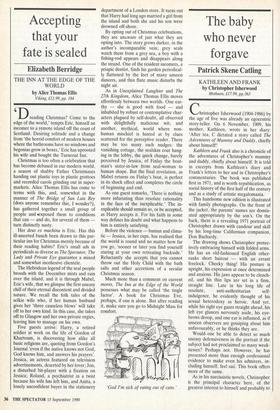Accepting that your fate is sealed
Elizabeth Berridge
THE INN AT THE EDGE OF THE WORLD by Alice Thomas Ellis
Viking, £12.99, pp. 184
Dreading Christmas? Come to the edge of the world,' tempts Eric, himself an incomer to a remote island off the coast of Scotland. Desiring solitude and a change from 'the horrid comfort of modern houses where the bathrooms have no windows and begonias grow in boxes,' Eric has uprooted his wife and bought the Turncoat Inn.
Christmas is too often a celebration that has become debased in our modern world, a season of shabby Father Christmases handing out plastic toys in plastic grottoes and recorded carols grinding out in super- markets. Alice Thomas Ellis has come to terms with this, and, somewhat in the manner of The Bridge of San Luis Rey (does anyone remember this, I wonder?), has gathered together a small group of people and 'exposed them to conditions that can — and do, for several of them — turn distinctly nasty.
Her deus ex machina is Eric. Has this ill-assorted bunch been drawn to this par- ticular inn for Christmas merely because of their reading habits? Eric's small ads in periodicals as diverse as The Spectator, The Lady and Private Eye guarantee a mixed, and somewhat incohesive clientele.
The Hebridean legend of the seal people broods with the December mists and rain over the island, and it is through Mabel, Eric's wife, that we glimpse the first uneasy chill of their eternal discontent and divided nature. We recall the folk .tales of the selkie wife who, if her human husband gives her 'three causeless blows' will take off to her own kind. In this case, she takes off to Glasgow and her own private orgies, leaving him to manage on his own.
Five guests arrive: Harry, a retired soldier at work on the life of Gordon of Khartoum, is discovering how alike all basic religions are, quoting from Gordon's Journal 'even if the native knows not God, God knows him, and answers his prayers'. Jessica, an actress featured on television advertisements, deserted by her lover; Jon, a disturbed bit-player with a fixation on Jessica; Roland, a psychiatrist in a twist because his wife has left him, and Anita, a lonely unconfident buyer in the stationery department of a London store. It turns out that Harry had long ago married a girl from the island and both she and his son were drowned off-shore.
By opting out of Christmas celebrations, they are unaware of just what they are opting into. The story grows darker, in the author's incomparable vein; grey seals watch them from a grey sea, a boy with a fishing-rod appears and disappears along the strand. One of the resident incomers, a priapic dentist, finds his garden periodical- ly flattened by the feet of many unseen dancers, and thin flute music disturbs the night air.
As in Unexplained Laughter and The 27th Kingdom, Alice Thomas Ellis moves effortlessly between two worlds. One ear- thy — she is good with food — and inhabited by robust or contemplative char- acters plagued by self-doubt, all observed with delightfully malicious wit; and another, mythical, world where non- human mischief is hinted at by clues scattered for the perceptive reader. There may be too many such nudges: the vanishing cottage, the sealskin coat hang- ing in the lobby, the quick change, barely perceived by Jessica, of Finlay the boat- man's sister-in-law from seal-woman to human shape. But the final revelation, as Mabel returns on Finlay's boat, is perfect in its shock effect and completes the circle of beginning and end.
As one guest remarks, 'There is nothing more infuriating than resolute rationality in the face of the inexplicable.' The in- explicable should remain so, or be accepted, as Harry accepts it. For his faith in some way defines his doubt and what happens to him is entirely satisfying.
Before the violence — human and clima- tic — Jessica, in her cups, has realised that the world is round and no matter how far you go, 'sooner or later you find yourself staring at your own retreating backside.' Reluctantly she accepts that you cannot throw out the Holy Child with the bath salts and other accretions of a secular Christmas season.
Much more than a comment on current mores, The Inn at the Edge of the World possesses what may be called 'the tingle factor'. A book for Christmas Eve, perhaps, if one is alone. But after reading it, make sure you go to Midnight Mass for comfort.
`God I'm sick of eating out of cans.'


























































 Previous page
Previous page